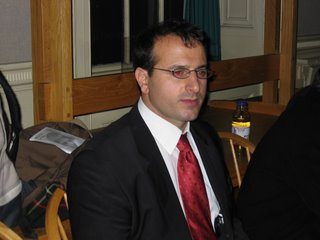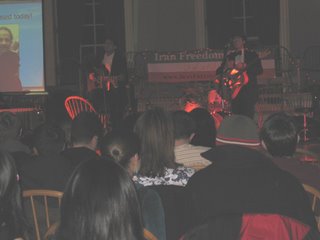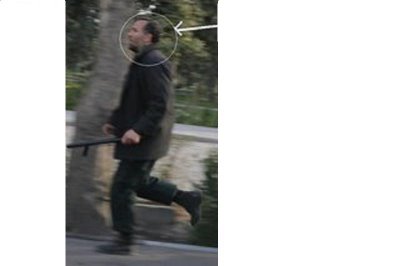
Since I am not a professional journalist, I have paraphrased the words of the individual I am interviewing.
Question 1SI: What is the best thing that the United States government can do to help towards sovereign democratic changes in Iran that maintain respect for human rights?
AA (paraphrased): The United States should try to use its influence in the United Nations to push for Human Rights and Democratic Reforms in Iran. I disagree with forms of sanctions that hurt the Iranian people. I believe foreign countries should freeze the hardliner’s personal assets and money. Others should close down Iranian embassies in their countries, and refuse to grant hardliners involved in oppression permission to travel in their lands.
Question 2SI: What can Iranians living in homelands other than Iran do to help their brothers and sisters?
AA (paraphrased): I believe Iranians living abroad should make efforts to create a strong grouping, and demand their governments to put pressure on Iran to improve its Human Rights practices. One pressure tactic that different countries can employ is to have their relationship with Iran depend on their Human Rights improvements. Many European countries are reluctant to criticize Iran’s Human Rights, because of the irresistible business bargains they receive from Iran.
Question 3SI: In order for Iranians to be able to assemble successfully, they need to advertise the time/date of protest. However at the same time, the Iranian hardliners learn of the plans, and pre-empt the demonstration by arresting the protestors beforehand. In your opinion, what can be done for more successful protests?
AA (paraphrased): The reason why the planned protests fall apart is because the scale of protests is too small. If all of the Iranian people could unite and hit the streets in massive proportions, the hardliners cannot crush them.
Question 4SI: In your opinion, what percent of the Iranian population want the current government?
AA (paraphrased): 10-20% at most is supportive of the regime. There is a large group of Iranians that are unhappy with the situation in Iran, but feel that they cannot do anything about it. They are waiting for an opportunity to present itself that will give them a chance for change.
Question 5SI: One of the reasons why the boycott of the presidential elections in this past June failed was speculated to be due to election fraud. What is your opinion of a neutral United Nations elections observation team?
AA (paraphrased): This team would probably not change much because as we have seen with President Khatami’s struggles, the president in Iran has no real power. All the decisions come from Iran’s supreme leader. In the past elections, in my opinion, 50% of the people did not even vote. We had some voter fraud, some people voted for Ahmadinejad simply because they didn’t want to vote for Rafsanjani, others voted because of the appeal of Ahmadinejad’s slogan: “I will put the oil money on your dinner table”.
Question 6SI: Ahmadinejad got elected based on his rallying for the poor, yet when the bus drivers in Tehran went on strike for better wages and benefits from the government, they were treated very harshly and thrown into jail. In some instances the involved bus driver’s innocent wives and small children were arrested and beaten as incentive for the individuals to turn themselves in and get their families released. Can you offer some insight into this contradiction? Where do the poor really stand with Ahmadinejad?
AA (paraphrased): In my opinion Ahmadinejad just stated some slogans so that he could get elected. He does not care about the poor and aside from a marriage aid Fund; he has not done much for them since he came into office. He is busy focusing himself on Israel and Nuclear Technology issues.
Question 7SI: Could you offer more insight/ better descriptions of your impression of a typical hardliner/Basiji, and his motives for the crimes he/she commits?
AA (paraphrased): A portion of this group does not have much depth in thought or perception, they simply believe that engaging in these acts will endear them to God. The remaining receive status and/or money and/or benefits in exchange for their actions.
SI: It doesn’t matter to them that they receive these things in return for them to commit these crimes?
AA (paraphrased): No, they don’t care.
Question 8SI: In many previous protests, it was rumored that a good number of plain clothed police would speak Arabic to each other. In light of the Iranian government’s harshness to the Iranians with Arabic ethnicity in the south of the country, it seems unlikely that there is much recruitment from that location. So, who are these Arabic speaking plain clothed police?
AA (paraphrased): Some of them are actual Basijis. However, there are also a number of Iranians that have worked in various posts in Arab countries like Lebanon and Iraq. They have learned to speak the language that way.
Question 9SI: In your opinion, would a referendum that was to follow previous public in-depth debates over the issues of Human Rights and Democracy be welcomed by the Iranian people?
AA (paraphrased): The people are waiting for some form of an opportunity. I believe they would embrace it positively.
Question 10SI: Do you believe that a fair democratic and human rights respecting government should separate religion from government?
AA: Absolutely.
Question 11SI: Should a regime change occur in Iran, do you think the Iranian people would be capable of forgiving the hardliners?
AA (paraphrased): The Iranian people have no choice; otherwise we will not be able to move forward any other way. We absolutely need a development such as the likes of Mahatma Ghandi and Nelson Mandela’s freedom movement.
Question 12SI: Any advice for Iranians inside and outside of Iran that want to get involved in Iran’s fight for Freedom, Human Rights and Democracy?
AA (paraphrased): Only that the movement without a doubt needs to be nonviolent. Retaliation for violence and murder only trips us into more cycles of violence and murder.
I thanked him for the interview. He asked if the woman that heckled him during his speech was an Iranian. Why did she say what she said? I mentioned perhaps she was opposed to war with Iran. Akbar Atri responded by stating that he was not for a war on Iran either. He also asked me if the woman thought that the hardliners were so innocent about the 1999 incident, why does she not live in Iran. I had no answer for that, because he had a point that I agreed with.
It is the opinion of this interviewer, that it doesn't make a difference weather one student died or 500, the punishment of death for peacefully expressing one's views is unjust. In this case, if someone had a problem with an aspect of Akbar Atri's activism, he or she should have addressed that specifically instead of diminishing the crimes that had taken place in 1999. Constructive criticism is always helpful and would improve progress immensely.



















0 Comments:
Post a Comment
<< Home